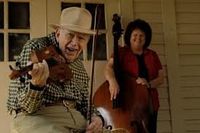Annotation:Old Yeller Dog
Back to Old Yeller Dog
OLD YELLER DOG (COME TROTTIN' THROUGH THE MEETING HOUSE). AKA and see "Old Grey Mare," "Old Blind Dog." Old-Time, Breakdown. G Major (usually): F Major. Standard or FCfc (Rayna Gellert) tuning (fiddle). AABB. Rayna Gellert plays this tune in F, cross-tuned, although she notes that it is normally played in standard tuning in the key of G. See also Earl Johnson's "Old Grey Mare Kicking Out of the Wilderness." Source Charlie Acuff had the tune from his grandfather, also named Charlie Acuff, from whom the young Charlie learned to fiddle.
The presence of dogs in a house of worship may seem incongruous to many, but the practice was not rare at one time, particularly in the South. South Carolina minister Charles Woodmason found it necessary to bar his congregation from bringing their animals with them to church in the late 18th century. Not only were they troublesome, he explained, they were also "an affront to the Divine Presence...to mix unclean things with our service." Yet, the population was only imitating longstanding practice in Britain. This passage is from James Hall's Travels in Scotland, by an Unusual Route: With a Trip to the Orkneys and Hebrides (London, 1807, p. 428):
I was amazed to see how much the minister in the interior of the Highlands are plagued with dogs in their churches. As almost every family has a dog, and some two, and as these dogs generally go with the people to church; so many dogs being collected often fight, and make such a noise during public worship, as not only disturbs the congregation, but endangers the limbs of many. I have seen more than twenty men plying with good cudgels, yet unable to separate a number of dogs fighting in a church. Nay, so much trouble do dogs give in some churches, that there is one appointed to go through the church-yard with a kind of longhandled forceps, which he holds out before him, and with which he wounds the tails, legs, and ears, &c. of the dogs, and thereby keeps the church and church-yard clear of these useful, but totally unnecessary animals in a place of public worship. Indeed, as these long-handled forceps have been found so useful in the Highlands, perhaps they might be of use in some other places; for ladies in too many places bring their lap-dogs to church, both on the north and south side of the Tweed. It often happens that a lady's lap-dog, running out and into her muff at church, and playing other antic tricks, draws more attention than the parson..."

Source for notated version: Charlie Acuff [Phillips].
Printed sources: Phillips (Traditional American Fiddle Tunes, vol. 1), 1994; p. 176.
Recorded sources:
See also listing at:
Jane Keefer's Folk Music Index: An Index to Recorded Sources [1]
